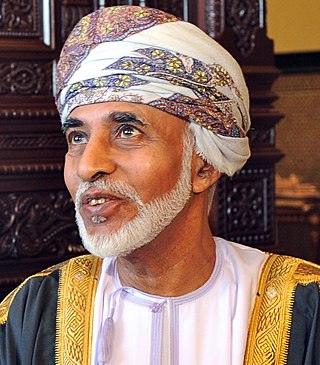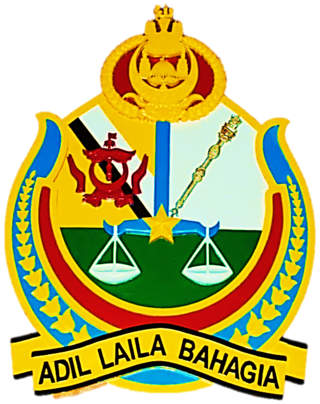
The Czech Republic is a unitary parliamentary republic, in which the president is the head of state and the prime minister is the head of government. Executive power is exercised by the Government of the Czech Republic, which reports to the Chamber of Deputies. The legislature is exercised by the Parliament. The Czech Parliament is bicameral: the upper house of the Parliament is the Senate, and the lower house is the Chamber of Deputies. The Senate consists of 81 members who are elected for six years. The Chamber of Deputies consists of 200 members who are elected for four years. The judiciary system is topped by the trio of the Constitutional Court, Supreme Court and Supreme Administrative Court.

The Politics of Oman take place in a framework of an absolute monarchy, where the Sultan of Oman is both head of state and head of government. The Sultan is hereditary, who appoints a cabinet to assist him. The sultan also serves as the supreme commander of the armed forces and prime minister.

The prime minister of the Netherlands is the head of the executive branch of the Government of the Netherlands. Although the monarch is the de jure head of government, the prime minister de facto occupies this role as the officeholder chairs the Council of Ministers and coordinates its policy with the rest of the cabinet. In his role as head of government, the prime minister also represents the Netherlands in the European Council. The current acting prime minister, Mark Rutte, has been in the position since 14 October 2010, with his fourth cabinet being inaugurated on 10 January 2022. He resigned his position on 7 July 2023 and until a new prime minister is sworn in after the 2023 Dutch general election, he will serve in a demissionary capacity.
A deputy prime minister or vice prime minister is, in some countries, a government minister who can take the position of acting prime minister when the prime minister is temporarily absent. The position is often likened to that of a vice president, as both positions are "number two" offices, but there are some differences.

Qaboos bin Said Al Said was Sultan of Oman from 23 July 1970 until his death in 2020. A fifteenth-generation descendant of the founder of the House of Al Said, he was the longest-serving leader in the Middle East and Arab world at the time of his death, having ruled for almost half a century.

The prime minister of Turkey, officially the prime minister of the Republic of Turkey, was the head of government of the Republic of Turkey from 1920 to 2018, who led a political coalition in the Turkish Parliament and presided over the cabinet. Throughout the political history of Turkey, functions and powers of the post have changed occasionally. Prior to its dissolution as a result of the 2017 Constitutional Referendum, the holder of the premiership was generally the dominant figure in Turkish politics, outweighing the president.

The prime minister of Tanzania is the leader of government business in the National Assembly of the United Republic of Tanzania. The position is subordinated to the president, who is the actual head of government.

The deputy prime minister of Malaysia is the second-highest political office in Malaysia. There have been 15 officeholders since the office was created in 1957. The first prime minister of Malaysia, Tunku Abdul Rahman, started the convention of appointing a deputy prime minister, but some cabinets have opted not to appoint a deputy prime minister.

The Legislative Council of Brunei is a national unicameral legislature of Brunei. The council comprises 36 appointed members, that only has consultative tasks. Under Brunei's 1959 constitution, His Majesty Hassanal Bolkiah is the head of state with full executive authority, including emergency powers since 1962. The Council holds its sitting annually in March at the Legislative Council Building in Bandar Seri Begawan.
The Cabinet of Malaysia is the executive branch of the Government of Malaysia. Led by the Prime Minister, the cabinet is a council of ministers who are accountable collectively to the Parliament. According to the Article 43 of the Federal Constitution, members of the Cabinet can only be selected from members of either houses of Parliament. Formally, the Yang di-Pertuan Agong appoints all Ministers on the advice of the Prime Minister. The constitution is amended by repealing the Clause (8) of Article 43, enabling a person who is a member of State Legislative Assembly to continue to serve even while serving as a minister or deputy minister in the cabinet. Ministers other than the Prime Minister shall hold office during the pleasure of the Yang di-Pertuan Agong, unless the appointment of any Minister shall have been revoked by the Yang di-Pertuan Agong on the advice of the Prime Minister but any Minister may resign from office. In practice, the Yang di-Pertuan Agong is obliged to follow the advice of the Prime Minister on the appointment and dismissal of ministers.

Tan Sri Dato' Haji Mahiaddin bin Md. Yasin, commonly known as Muhyiddin bin Mohd. Yassin, is a Malaysian politician who served as the eighth Prime Minister of Malaysia from 2020 to 2021. Appointed as prime minister amid a political crisis, Muhyiddin served for 17 months and resigned after losing parliamentary support.

The Government of Malaysia, officially the Federal Government of Malaysia, is based in the Federal Territory of Putrajaya, with the exception of the legislative branch, which is located in Kuala Lumpur. Malaysia is a federation comprising the 11 States of Malaya, the Borneo States of Sabah and Sarawak, and 3 Federal Territories operating within a constitutional monarchy under the Westminster system and is categorised as a representative democracy. The federal government of Malaysia adheres to and is created by the Federal Constitution of Malaysia, the supreme law of the land.

The Council of Cabinet Ministers is the body of high-ranking Brunei officials, consisting of the top leaders of the executive branch of Brunei government. Led by the Sultan himself, who has also been the Prime Minister of Brunei since 1984.

The Deputy Prime Minister is a former political position in Zimbabwe which has existed twice in the history of Zimbabwe.

The Third Working Cabinet was an Indonesian cabinet that resulted from a 6 March 1962 reshuffle of the previous cabinet by President Sukarno. It consisted of a first minister, two deputy first ministers, eight coordinating ministers, 36 ministers, as well as 13 members who headed various government bodies. It was dissolved on 13 November 1963.

The Cabinet of Oman is the chief executive body of the Sultanate of Oman. Sultan Haitham bin Tariq heads the cabinet as the Prime Minister.

Haitham bin Tariq Al Said is Sultan and Prime Minister of Oman.

Sayyid Theyazin bin Haitham Al Said is the Crown Prince of Oman and the Minister of Culture, Sports, & Youth.
Sayyid Fahr bin Taimur Al Said was a member of the Omani royal family and one of the Deputy Prime Ministers of Oman, from 1976 to 1996, during the reign of his nephew Qaboos bin Said.















